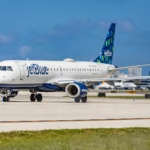Gas and electricity bills in the UK will be going up in April this year. According to the BBC, the average household gas and electricity bill will go up by £693. In April there will be a 54% increase in price when compared to last year. The government will only help cover part of the cost. So why is this happening? And how does this affect the aviation industry?
Why has the price of gas gone up?
A worldwide squeeze on energy supplies has pushed to price of gas up to high levels. According to the BBC a cold winter in Europe 2020/21 put pressure on supplies and therefore reduced the amount of gas that was kept and stored. In addition, the summer of 2021 was less windy which made it difficult to generate wind energy and therefore put more pressure on fossil fuels. Furthermore, increased demand for gas from Asia and in particular China, put pressure on liquified natural gas supplies.
The reason all of the above causes problems for the aviation industry is because it is also affected by the worldwide squeeze in energy supplies as this would also affect the price of oil. In addition, gas generates a third of the UK’s electricity supply so as gas becomes more expensive there will be more pressure to use other fossil fuels to satisfy demand, again pushing up oil prices.

In the US, airlines have already had to deal with a hike in oil prices in 2021 due to freezing weather increasing demand. At the same time supply was reduced due to the fact that the cold weather also affected oil production in Canada, North Dakota, Oklahoma, Texas and elsewhere. Thus there was an increase in demand for oil, but a reduced supply significantly affecting oil prices.
How will the Aviation Industry Respond?
Increases in jet fuel prices are not easy for airlines to deal with in Covid times when demand for flights is low. This reduced demand means that they may also find it hard to increase prices due to the fact that this may result in even lower demand for flights. Up till last year, jet fuel prices were lower because Covid restrictions meant that demand for air travel was less so fewer planes were flying. However, since last year prices started rising in the US due to the freezing weather as discussed. Thankfully this rise was still minimised because flying is still lower now due to Covid. This meant that the increase in jet fuel prices was less than it would have been otherwise.

According to CNBC, the US airline carrier Spirit Airlines CFO Scott Haralson is cited as saying that higher fuel costs would be among the discount airlines first quarter challenges. He said this on February 11 2021. It may be that European discount airlines such as EasyJet may face the same difficulty this year due to increasing prices.
Jet fuel prices are one of an airlines biggest expenses along with labour. In the US, labour costs are supported by billions in federal aid. This will no doubt help soften the blow of more expensive fuel. Perhaps the British government may have to increase furlough payments to airline companies in order to help them during this difficult time.
As one can see, airlines will find it more difficult to deal with increased fuel charges at a time when they are already struggling due to Covid. This is more likely to affect discount carriers who have customers that are more likely to be affected by an increase in price. Perhaps government help will be needed. However, it does appear that due to continued lower demand for flights, jet fuel price increases will be minimised. So therefore, airlines have less to worry about now and will have time to plan for what happens if prices increase further. Perhaps using more fuel efficient planes and greener technologies may also help.









